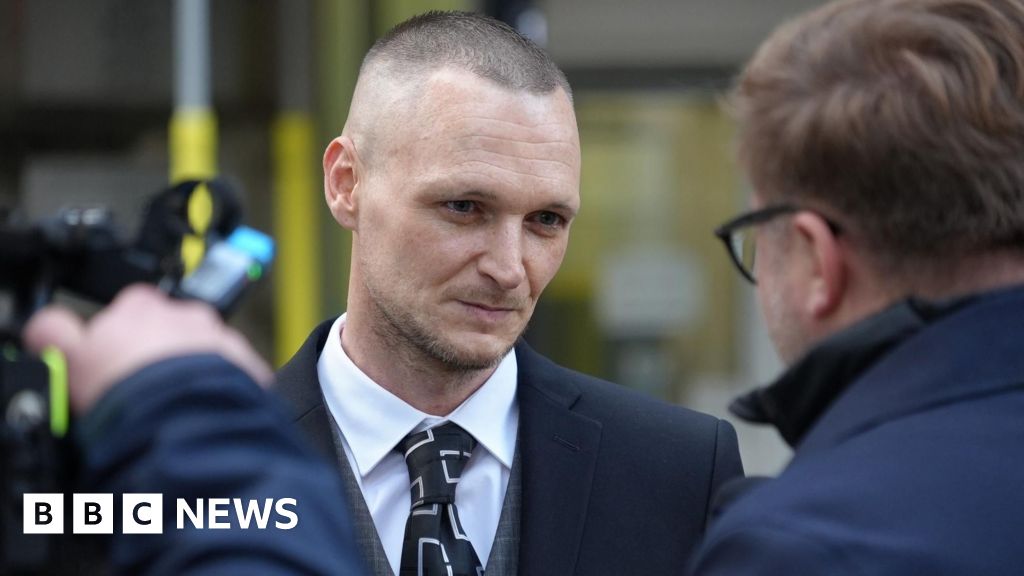
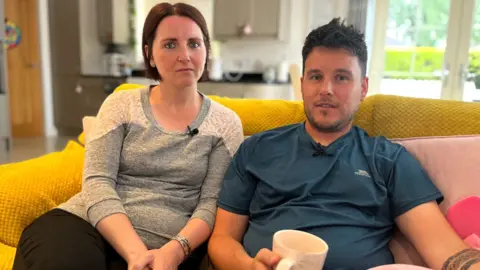 BBC
BBC
Laura and Michael O'Hare said putting a name to their daughters' genetic disorder has helped them in the grieving process
“I take a lot of comfort from the fact that our daughters’ stories and their short lives are now helping other families.”
Laura O’Hare’s daughters both died soon after being born with a rare genetic disorder.
Initially she and her husband Michael were left bereft with lingering questions about what had happened.
But their answers would eventually come from an innovative project that has been mapping rare disease DNA across the UK.
For more than 10 years the 100,000 Genomes Project has been tracing and comparing the genomes of tens of thousands of patients with rare diseases and their relatives.
Anna and Olivia
Michael and Laura, who now live in Lurgan, were among the first participants from Northern Ireland.
Their first daughter Anna was born in 2016 but died 29 days later.
Laura said: “At the 20-week scan we were told there may be an issue, and when she did pass away we were of course heartbroken.
“But at that stage the medical staff thought it was a one-off and we wanted to try and have another child.”

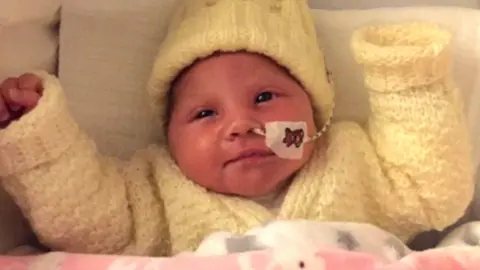 O'Hare Family
O'Hare Family
Baby Anna was born in 2016
In 2017, their second daughter Olivia was born, but she passed away 64 days later.
Michael said: “We were again devastated and not having answers at that stage was really hard.
“But after Olivia, the doctors obviously began to realise that it was possibly something genetic and that’s when we were introduced to the 100,000 genome project and Dr McKee, and that changed everything.”
The 100,000 Genome Project
Dr Shane McKee is originally from County Tyrone and is now a consultant in Genetic Medicine at the Belfast Trust.
He led the Northern Ireland branch of the UK-wide project.
Since 2013, it has been using the latest technology to analyse the complete genetic sequence of 100,000 patients across the UK with rare disorders and their family members, along with patients with cancer,
Northern Ireland was invited to join the project in 2015, involving five health trusts, both universities and the NI Rare Diseases Partnership (NIRDP).

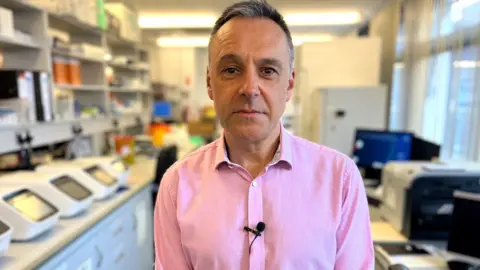
Dr Shane McKee leads the 100,000 genome project in Northern Ireland
Dr McKee said: “Our genome and DNA are the instructions that put us all together, and we’re all made up of it, it comprises a huge amount of information.
“For example, if you were to print out the DNA of one person on normal size paper and stack it up, it would be the size of the Eiffel Tower.”
Dr McKee added: “So the 100,000 genomes project has been hugely ambitious, to sequence the genomes of all these people to try and find any slight changes.
“Fortunately we have huge computers to help with that, and the whole point is to try and give families answers.”
Answers
After meeting Laura and Michael following their daughters’ deaths, Dr McKee enrolled them in the 100,000 genome project.
It would eventually identify that their daughters had a rare disease known as Fowler's Syndrome.
This is a genetic disorder that affects the embryo when it is growing in the womb.
It causes the blood vessels within the lining of the brain to overgrow and form a barrier that stops the cells from migrating from the inner part of the brain to the outer part of the brain.
Laura said being able to put a name to their daughters’ genetic condition has been hugely important in their grieving process.
“It did help bring a form of closure, and we also found out that most children with Fowler’s Syndrome would pass before being born or very soon after.
“So it makes those weeks that we had with both our girls even more special, to know they defied the odds.”
Dr McKee said that helping to find the precise genetic causes of rare diseases will ultimately help advance scientific understanding and hopefully design better treatments.

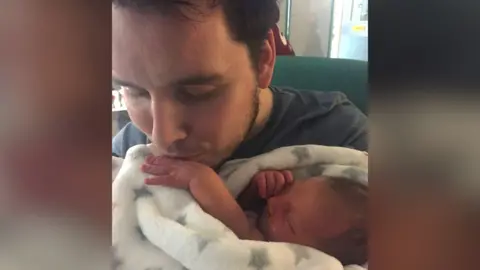
Michael O'Hare and his daughter Anna
He added: “Laura and Michael’s participation, as well as the participation of hundreds of other families in Northern Ireland will undoubtedly help other people and already has.
“Laura gave me permission to speak about her daughters when teaching medical students about genetics, and that has also been extremely powerful.”
Michael said: “We might not get to spend our lives with them, but the fact that our girls might help other families is amazing to me.
“As a daddy, if I wanted our girls to go on and achieve something, you can’t ask for anything more than that, I’m so proud of them.”
A rare disorder is defined as a condition which affects less than five per 10,000 people in the population.
About 100,000 people in Northern Ireland – one in 17 – are affected by a rare disorder.
If you have been affected by any of the issues raised in this article, help and support is available at BBC Action Line.
 (1).png)
 4 months ago
8
4 months ago
8
